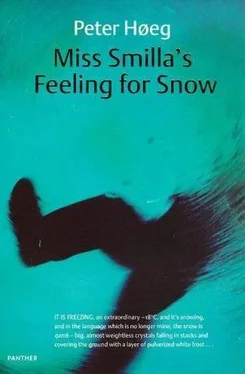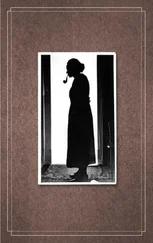Peter Høeg - Smilla's Sense of Snow aka Miss Smilla's Feeling for Snow
Здесь есть возможность читать онлайн «Peter Høeg - Smilla's Sense of Snow aka Miss Smilla's Feeling for Snow» весь текст электронной книги совершенно бесплатно (целиком полную версию без сокращений). В некоторых случаях можно слушать аудио, скачать через торрент в формате fb2 и присутствует краткое содержание. Жанр: Современная проза, на английском языке. Описание произведения, (предисловие) а так же отзывы посетителей доступны на портале библиотеки ЛибКат.
- Название:Smilla's Sense of Snow aka Miss Smilla's Feeling for Snow
- Автор:
- Жанр:
- Год:неизвестен
- ISBN:нет данных
- Рейтинг книги:3 / 5. Голосов: 1
-
Избранное:Добавить в избранное
- Отзывы:
-
Ваша оценка:
- 60
- 1
- 2
- 3
- 4
- 5
Smilla's Sense of Snow aka Miss Smilla's Feeling for Snow: краткое содержание, описание и аннотация
Предлагаем к чтению аннотацию, описание, краткое содержание или предисловие (зависит от того, что написал сам автор книги «Smilla's Sense of Snow aka Miss Smilla's Feeling for Snow»). Если вы не нашли необходимую информацию о книге — напишите в комментариях, мы постараемся отыскать её.
Smilla's Sense of Snow aka Miss Smilla's Feeling for Snow — читать онлайн бесплатно полную книгу (весь текст) целиком
Ниже представлен текст книги, разбитый по страницам. Система сохранения места последней прочитанной страницы, позволяет с удобством читать онлайн бесплатно книгу «Smilla's Sense of Snow aka Miss Smilla's Feeling for Snow», без необходимости каждый раз заново искать на чём Вы остановились. Поставьте закладку, и сможете в любой момент перейти на страницу, на которой закончили чтение.
Интервал:
Закладка:
After this picture there's a gap of ten years. The last clipping is from May 1939.
It's a photo with a caption. The picture was taken in a harbor. A dark ship is in the background. About a dozen pwople are standing in the foreground. Gentlemen in lightweight suits, women in long skirts and thin wraps. The setting makes it seem staged. The caption is quite brief: "The courageous and enthusiastic company from Freia Film upon departure for Greenland." Then follows a list of the courageous and enthusiastic company. It consists of actors and a director, the film company's doctor and his assistant. The doctor's name is Rovsing. The assistant is unnamed. Assistants didn't have names in the conservative press in the thirties. But his later career has preserved this photo as well in an archive, and prompted someone to add his name with a ballpoint pen. He's visible in the photograph. Taller than everyone else. And in spite of his youth, his subordinate position, and his spot behind eccentrics pandering to the camera, his arrogance slaines through even then. It's Loyen. I fold up the clipping.
After breakfast I put on a long suede coat and the Jane Eberlein fur hat. The coat has deep inside pockets. Into them I put the last, folded clipping, a bundle of krone notes, Isaiah's tape, and the letter to my father. Then I leave. The day has begun.
At Pronto Print on Torve Street I have a copy of the tape made. I also borrow their phone book. The Institute for Eskimology is located on Fiol Lane. I call them from the phone booth on the square. I'm transferred to an instructor who sounds as if he is of Greenlandic extraction. I explain that I have a tape in East Greenlandic that I can't understand. He asks me why I don't go over to the Greenlanders' House.
"I want an expert. It's not just a matter of understanding what is said. I want to try to identify who is speaking. I'm looking for someone who can listen to the voice and tell me that the speaker has henna-dyed hair and was spanked as a five-year-old when he was sitting on the potty, and from his vowels it sounds as if this happened in Akunnaaq in 1947."
He starts chuckling to himself. "Do you have money, madam?"
"Do you? And it's not madam. It's miss."
"Svajer Wharf. It's on the South Harbor. Berth number 126. Ask for the curator."
He's still chuckling as he hangs up.
I take the train to Enghave Station. From there I walk. I've had a look at Krak's Map of Copenhagen at the library on Torve Street. In my mind I have an image of a labyrinth of winding streets.
The station is cold. A man is standing on the opposite platform. He's staring longingly toward the train that will take him away, into the city, into the crowds. He's the last person I see.
Right now the inner city is like an anthill. Now people are crowding into the department stores. They're getting ready for theater premieres. They're standing in line in front of Hviid's Wine Cellar.
The South Harbor is a ghost town. The sky is low and gray. The inhaled air tastes of coal smoke and chemicals. Anyone who is afraid that machines will soon take over should not take a stroll in the South Harbor. The snow hasn't been cleared away. The sidewalks are impassable. Now and then enormous double semis with dark windows devoid of any humans move along the narrow, plowed roads. A blanket of green smoke hovers over a soap factory. A cafeteria advertises hash browns and sausages. Behind the windows red and yellow lights shine on lonely deep-fat fryers in an empty kitchen. A above a snowy pile of coal a crane moves aimlessly and restlessly back and forth on its rails. There are bluish glimmers through the cracks in closed garage doors, and the crackling of arc welders, and the jingling of the illegal money being earned, but no human voices.
Then the road opens onto a picture postcard: a large harbor basin surrounded by low yellow warehouses. The water is iced over, and while I'm still taking stock of the view, the sun appears, low, white-gold, surprising, and lights up the ice like an underground bulb behind frosted glass. There are small fishing boats at the wharf with blue hulls the color of the sea where it meets the horizon. On the outer edge of the basin, out in the harbor itself, there is a big three-masted sailing ship. That's Svajer Wharf.
Berth 126 is the sailing ship. I don't meet a soul on the way. All the machine sounds have disappeared behind me. Everything is quiet.
A post is sticking up from the wharf with a white, mailbox on it. Above is a large sign, still wrapped in white plastic.
On the stern it says in gilded letters that the ship's name is Northern Light. It has a figurehead carved like a rnan holding a torch; it has a shiny black hull at least a hundred feet long, masts that tower up to the sky and give the impression that you're standing in front of a church, and a smell of tar and sawdust. Someone has recently spent a fortune renovating it.
I go on board via a gangway with a thick coir mat and railings with polished bronze knobs. The entire deck is filled with big wooden crates marked FRAGILE and stacks of planks and paint cans. All the ropes are meticulously coiled up, all the wood has the deep, dark brown sheen of a dozen layers of expensive ship's lacquer. The white enamel shines like glass. The air shimmers with polish, two-component epoxy, and joint paste. Aside from this shimmering, the ship is apparently deserted.
A narrow ladder between the crates leads to a lacquered double door that isn't locked. Beyond the door a companionway descends into the darkness.
A man is standing at the bottom of the steps. He's leaning on a spear, and he doesn't move. Not even when I'm quite close to him.
The room must have several skylights that are still covered. But along the edges of the covers, thin stripes of white light filter in. Enough so that I can see it's a big hall. All the dividing walls have been torn out to create an area that is about eighty feet long and just as wide as the ship.
Now there is enough light for me to see that the man in front of me is an Inuit. What he's leaning on is a long harpoon. In his left hand he's holding a dart thrower. He is only partially dressed, in high kamiks and an inner coat of bird skin. He isn't much taller than me. I pat him on the cheek. He is cast from hollow fiberglass and then cleverly painted. His face is alert.
"Lifelike, isn't it?"
The voice comes from somewhere behind a screen. On my way over to it I have to go around a kayak that is still partially wrapped and a glass counter lying there like an empty 800-gallon aquarium. The screen is a hide stretched between two whalebones. Behind it is a desk. Behind the desk sits a man. He stands up and I shake his proffered hand. He looks exactly like the mannikin. But he's thirty years older. His hair is thick and cut pageboystyle, but gray. His background is like mine. Greenlandic a in some way.
"You're the curator?"
"Yes, I am."
His Danish is without accent. He gestures with his hand. "We're in the process of setting up the collection. It cost a fortune."
I place the tape in front of him. He touches it cautiously.
"I'm trying to identify the man speaking. I found my way over here by calling the Institute for Eskimology."
He smiles with satisfaction. "Word of mouth is the best advertisement. And by far the cheapest. Do you know what it costs to advertise?"
"Only personal ads."
"Is that expensive?" He is sincerely interested. Humor is wasted on him. "Very."
He nods. "It's terrible. They clean you out. The newspapers. The tax system, the customs office…"
It seems to me that I've seen him before. It's a feeling that I get from faces and places more and more often. I don't know whether it's because I've seen so much that the world is starting to repeat itself, or whether it's due to premature wear and tear on the mental apparatus.
Читать дальшеИнтервал:
Закладка:
Похожие книги на «Smilla's Sense of Snow aka Miss Smilla's Feeling for Snow»
Представляем Вашему вниманию похожие книги на «Smilla's Sense of Snow aka Miss Smilla's Feeling for Snow» списком для выбора. Мы отобрали схожую по названию и смыслу литературу в надежде предоставить читателям больше вариантов отыскать новые, интересные, ещё непрочитанные произведения.
Обсуждение, отзывы о книге «Smilla's Sense of Snow aka Miss Smilla's Feeling for Snow» и просто собственные мнения читателей. Оставьте ваши комментарии, напишите, что Вы думаете о произведении, его смысле или главных героях. Укажите что конкретно понравилось, а что нет, и почему Вы так считаете.




![Рута Шепетис - Ashes in the Snow [aka Between Shades of Gray]](/books/414915/ruta-shepetis-ashes-in-the-snow-aka-between-shades-thumb.webp)







